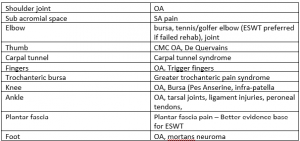Share
Steroid injections, also called corticosteroid injections, are anti-inflammatory medicines used to treat a range of conditions such as joint pain, arthritis and inflammatory pains
Who can benefit from them

What can we inject?

Corticosteroid injections
Corticosteroid injections have been widely used for pain relief in musculoskeletal (MSK) medicine and rheumatology since the 1940s. They are widely delivered under the NHS for management of pain of osteoarthritis and other MSK conditions.
The aim of the injections is to help relieve inflammation (swelling) and pain. The injection should reduce pain for least 6 weeks and allow you to slowly return to your normal activities and engage in your rehabilitation programme from your physiotherapist.
What are the possible side-effects of a steroid injection?
– Cosmetic changes including reduced skin pigment and/ or dimpling of the skin at the injection site
– Flushing of the face for a few hours
– Bruising at the injection site (more likely if you are on blood thinning medications)
– A temporary Increased pain (up to 2-3 days)
– Numbness, tingling or increased pain if a nerve has been touched by the needle
– Tendon rupture
– Slight vaginal bleeding
– Diabetic patients may notice a temporary increase in blood sugar levels and should monitor these after the injection for up to 10 days, seeking medical advice as needed
– Changes in Mood. This is more likely if you or your family have a history of psychosis
– Increased blood pressure, which is unlikely to be noticeable unless your blood pressure is currently not controlled
– Post injection joint Infection: This is very rare, one person in 10,000 may experience this. if the area that was injected becomes hot, red, swollen and very painful within 24-72 hours after the injection you should seek urgent medical attention
– Other infections: Avoid close personal contact with unwell individuals following steroid injection. For example, people with Chickenpox, measles, and tuberculosis, especially if you have not had chickenpox or completed routine childhood vaccinations
Anaphylaxis, which is a life-threatening allergic reaction. Anaphylaxis is extremely rare in response to injected steroids or local anaesthetic. You will be asked to wait for up to 30 minutes
Hyaluronic acid (Ostenil)
Hyaluronic acid (HA) is a natural component of joint fluid. The injection is designed to help to lubricate joints, which reduces inflammation and pain. These injections are sometimes best considered at regular intervals.
Ostenil is injected into the space in the joint and is designed to further lubricate the joint which will allow for decreased pain and stiffness to improve symptoms and allow the patient to engage in rehab exercises and strengthen the muscles surrounding the effected joint.
The sodium hyaluronate in all versions of OSTENIL® injections is very pure and is manufactured using a process called fermentation. It contains no animal proteins, which means that it is very unlikely to cause an allergic reaction. OSTENIL® has been given to thousands of patients and has not been found to cause any serious side effects. The exact make-up of the sodium hyaluronate in OSTENIL® has been carefully chosen so that it is as effective as possible in treating osteoarthritis.
You will probably not notice any benefits immediately after the first injection, but you should gradually start to feel less pain and stiffness over the next few weeks. The improvement in your symptoms is likely to persist for several months, depending on the progression of the degenerative change in the joint being treated.
What are the possible side-effects of a HLA injection?
– Bruising at the injection site (more likely if you are on blood thinning medications)
– Increased blood pressure for up to 3 days
– Fainting or feeling dizzy following injection
– A temporary Increased pain (up to 2-3 days)
– Post injection joint Infection: This is very rare, one person in 10,000 may experience this. if the area that was injected becomes hot, red, swollen and very painful within 24-72 hours after the injection you should seek urgent medical attention
Costs
Corticosteroid injections – £150
Hyaluronic acid £250
Related News
Vita is an award-winning, CQC registered healthcare provider














